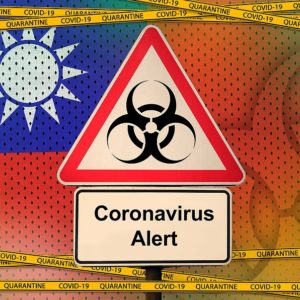In April, 200,000 Taiwan citizens received a text message alert from the Taiwan Central Epidemic Command Center. All were informed that they had been in contact with someone infected with COVID-19.
This was an alarming development, for despite schools and businesses remaining open, the spread of the virus seemed under control, with fewer than 400 cases recorded and only six deaths.
But, a Taiwanese naval defense flotilla had recently docked in the southern port in Kaohsiung, and 744 sailors spread out across the island. At least 28 of those sailors were found to be infected.
Just as alarming as this threat of outbreak was that the government seemed to have known everyone’s whereabouts well enough to send such message. Using mobile phone data, the Central Epidemic Command Center mapped the movement of the infected sailors with a timeline of their exact locations.
This was cross-referenced against citizens’ data, so that if your phone indicated that you were on a train from Kaohsiung to Taipei with one of those sailors, for example, you got a text.
There is no doubt that information generated by smart phones can help stop the spread of COVID-19, but much of the debate about how this would work has focused on the problem of whether citizens want bigger or smaller government.
Such framing forces citizens to think about privacy as something personal and data as something that we possess, but both these assumptions are misguided.
While the problems of surveillance are real, policymakers and the public should ask instead what government access to personal data looks like when transparency and democracy are the norm. Taiwan can provide such an example.
Not only does Taiwan have legislation in place to facilitate the use of data to specifically combat COVID-19, but in addition, tireless forums, public briefings and direct conversations between the public and the government have worked to develop a consensus on what those laws mean and how they are used.
In short, accountability and transparency have facilitated trust, as Health Minister Chen Shih-chung continues to emphasize.
These democratic efforts resonate with other nations that have moved toward government transparency and consensus building from below. Social movements the world over are also demanding citizen engagement and increased accountability of elected officials, on everything from data to abortion.
Governments need clear policy for the public use of data, complemented by a system that ensures the public has a voice in the decision-making process.
Taiwan’s experience can get governments halfway there, but it is premised on enlightened leaders making Herculean efforts to ensure that the public is involved in the conversation, and this aspect would be crucial for any country trying to replicate its success.
This must be complemented by institutions and procedures so as to remove the burden of success from those who happen to hold office at any given time. In particular, a more democratic system overall is needed — constituted by privacy laws, public discussion and mechanisms for public input.
First and foremost, a law akin to Taiwan’s privacy act could facilitate public access to data in times of emergency and only to ensure the safety of citizens. In order to avoid abuse, such a regulation would have to articulate what criteria constitute an emergency to necessitate a data-driven response.
A good example is the General Data Protection Regulation, passed by the European Union in 2018. This law governs how corporations gather, store or share data about individuals. Companies that violate these rules are fined. Although this remains at the level of the corporation, it could be scaled up to the level of a whole state.
Furthermore, democratic engagement must transcend public commentary on the current use of data. The public can be involved in the process of setting forward a series of policies about how data is shared in general. This includes defining the criteria that constitute an emergency of public health and deciding how public safety is determined.
Creating public debate around such issues allows citizens to articulate personal vulnerabilities around the use of their data. Through mechanisms such as citizen assemblies, the public can begin to lay out the terms of data collection, access and use.
The public should engage in a broad discussion about issues such as what government actions constitute abuse of authority and how to navigate hypothetical and real cases such as mobilizing data to target political minorities, punish opposition or influence an election.
Through such debates, citizens could settle on appropriate regulations to approve and deny governments the power to collect data on their citizens. Here citizens might set forth criteria for regulations on data storage and processing that keep pre-anonymized data out of the direct control of the government.
With standards and practices of this kind, data can be a useful tool in fighting pandemics and other emergencies, rather than becoming a weapon in the hands of those greedy for power.
If done right, governments that develop such practices could be very successful. Ordinary people in those countries would be able to sleep more easily knowing that government standards of data protection and transparency keep their democracy intact.
Indeed, all should welcome a text knowledgeable about their whereabouts, so long as governments are both transparent and democratic about their actions, and ensure that citizens are a part of the process.
After all, Taiwan has remained open throughout the pandemic and is one of the safest places on earth, in no small measure due to its ability to harness democratically its citizens’ data.

